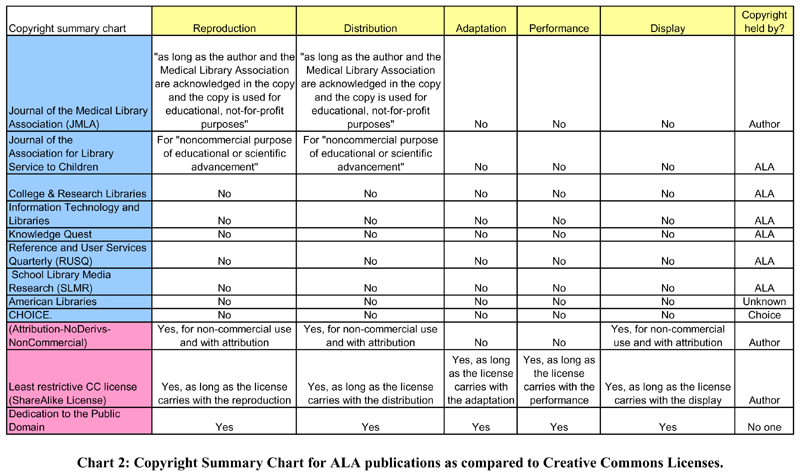This is in response to a very thoughtful comment here.
I did indeed contact Rick looking for names at the ALA, early in the writing of the paper in an attempt to gather more copyright statements. The focus of the paper changed several times in the writing, and after examining many options, the most time-expedient thing for me to do was to rely on the web statements. I was certainly not concerned about being lied to or anything of that nature. After the fact, I would guess that speaking with publishers would not have given me significantly more information about the copyright stance of the individual publications than were available on the respective webpages. I would have gotten more detailed information, perhaps, or a more nuanced understanding of the positions, but my assumption was that their position should be contained within their copyright statement. It might have been just as interesting to simply look at whether or not the journals were open…a simple deliniation of “open” or “closed” may have been enough to illustrate my position. The examination of the copyright policies was an attempt to draw further support for the paper.
To say that I had a “preordained conclusion” is partially true, of course. This paper was designed to show something. What that thing was changed several times over the writing of it, but it seems obvious that there is a disconnect between the ALA’s actions and speech. If I had started researching peer-reviewed ALA journals and found Open Access after Open Access, that would have indeed thrown a wrench in the paper. But that’s not what I found.
Do not mistake the fact that I think that the ALA has done marvelous things for information in this country. The cases mentioned in the paper are all positive, to my mind. The ALA has long been a champion of the freedom of information. That is why I was so surprised when I began looking over the actual journals.
It may be that we are of differing opinion on the burden of proof in this case. It is entirely possible that I have failed in the paper to give sufficient evidence for the claim(s) that I make, although I do believe that I am on the right track. I also believe that there is evidence that the ALA needs to examine its own journals, and that it should be “opening” its journals in the same way that it suggests that other publishers should. If this examination is the only result of this paper, then it has been a success.
As I’ve said repeatedly, I am currently working on a revision of this into an article for submission to a journal. In that article, I hope to address many of the concerns brought forward re: Perils of Strong Copyright. As a Master’s Paper, I think it was successful in what I was attempting to do: show that there is a disconnect of a type within the ALA as it pertains to Open Access of information. There are MANY disconnects within the ALA, and indeed, with any large organization. It is only when they are pointed to that they are dealt with…the hope was only that Perils be a signpost pointing towards a better future for the organization.
